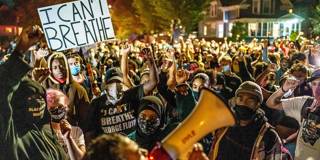As Nelson Mandela argued in 2001, “a vibrant network and range of civil society activities and organs” is essential to “cement the foundations” of democracy. At a time when those foundations seem to be under siege, this lesson is more important than ever.
LAHORE – On May 25, 2020, a 17-year-old girl filmed a disturbing video, which subsequently went viral, of a white police officer in Minneapolis, Minnesota kneeling on the neck of a black man, handcuffed and lying facedown on the pavement, for nine minutes and 29 seconds. The man, George Floyd, died that day.
For millions of people worldwide, Floyd’s death was a wake-up call regarding the pervasiveness of systemic racism and police violence. The Black Lives Matter movement capitalized on this growing awareness, organizing protests on the streets of cities across the United States, which inspired demonstrations from France to Colombia to South Africa. And, in a testament to the power of organization, the protests effected real change.
The police officer who killed Floyd, Derek Chauvin, has now been convicted of murder and sentenced to more than 22 years in prison. But the BLM protests achieved something more consequential: the creation of an international commission, on which I served, to examine police racism in the US. We found that the persistent systemic racism against African-Americans in the US constitutes a crime against humanity and merits an investigation by the International Criminal Court.

LAHORE – On May 25, 2020, a 17-year-old girl filmed a disturbing video, which subsequently went viral, of a white police officer in Minneapolis, Minnesota kneeling on the neck of a black man, handcuffed and lying facedown on the pavement, for nine minutes and 29 seconds. The man, George Floyd, died that day.
For millions of people worldwide, Floyd’s death was a wake-up call regarding the pervasiveness of systemic racism and police violence. The Black Lives Matter movement capitalized on this growing awareness, organizing protests on the streets of cities across the United States, which inspired demonstrations from France to Colombia to South Africa. And, in a testament to the power of organization, the protests effected real change.
The police officer who killed Floyd, Derek Chauvin, has now been convicted of murder and sentenced to more than 22 years in prison. But the BLM protests achieved something more consequential: the creation of an international commission, on which I served, to examine police racism in the US. We found that the persistent systemic racism against African-Americans in the US constitutes a crime against humanity and merits an investigation by the International Criminal Court.